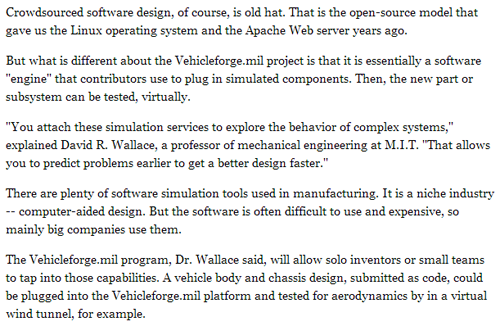WORKING TOGETHER — In the 19th Century, Professor James Murray struck up a literary project that required tens of thousands of volunteers to help him complete. His mailbox got bombarded with six million letters over the next several years from strangers documenting the definitions and origins of virtually every English word. It took seven decades to finish the first Oxford English Dictionary, the first crowdsourced collection of knowledge in known history.
Since that first manifestation of crowdsourcing, years before the term was coined by Jeff Howe in a June 2006 Wired magazine article, companies, government agencies and other entities have reverted to crowdsourcing to gather new ideas.
MANUFACTURING CHANGE — Could the crowdsourcing model fast-forward innovation in the manufacturing sector? The Pentagon thinks so. Earlier this year, the agency responsible for military funding created a crowdsourcing effort called the Defense Advanced Research Projects Agency, which aims to slash the design-to-production cycle by two to four years through offering prize incentives for design ideas, according to a New York Times article published in April. Since researching, developing and building U.S. military assets is a famously time-consuming and pricey ordeal, it normally takes anywhere from a decade or two to manufacture a new tank, the article says.
The defense research project will use a software platform called VehicleFORGE, a portal for the exchange of ideas. The online format makes sense, considering that crowdsourcing is nothing new to the software industry. Crowdsourcing is what spawned programs like Linux and Apache.

Teaming up with academic institutions could expand crowdsourcing possibilities even more. How much R&D time do you think a submission like that would save the pentagon? Or even a private company? Think of how much more can be accomplished if many more minds could tackle a project together.
"Sometimes the best and brightest ideas come from the most unlikely or unheralded sources," Associate Editor Mike Schmidt wrote for Manufacturing.net a couple months ago.
WHAT DO YOU THINK? — How could the practice of crowdsourcing change manufacturing? The good and the bad? Some commentators tout the practice as the "Holy Grail" of innovation, but what are some of the risks? Do the risks outweigh the benefits of diversifying your company's talent pool?

